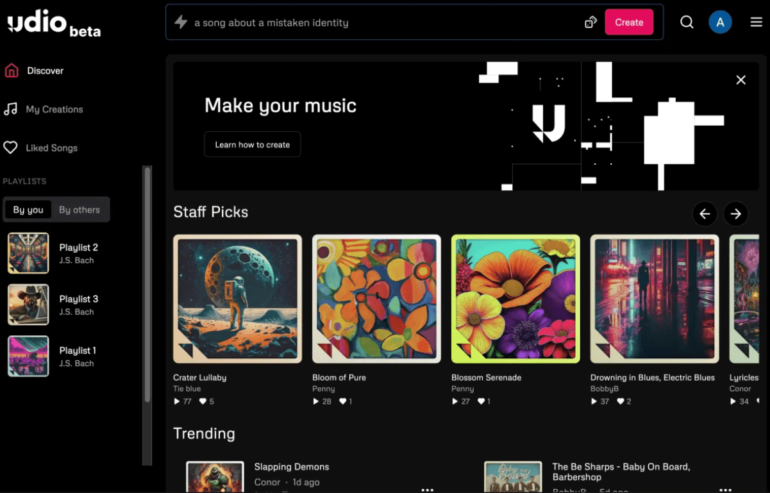- Udio, a novel AI music-synthesis platform, launched by ex-DeepMind employees, generates lifelike music from textual prompts.
- The service, akin to Suno, covers various genres and offers free access during its beta phase.
- Musicians express concerns about Udio’s impact on creativity and originality in the industry.
- Despite initial excitement, Udio’s output quality is questioned, revealing heavy human intervention.
- Udio’s transparent workflow includes a five-step process for song creation.
- Users can input text prompts, generating two musical snippets for selection.
- Collaborative features allow remixing and sharing within the Udio community.
- Udio ensures user ownership rights and employs measures to prevent copyright infringement.
Main AI News:
In a groundbreaking development, Udio, a pioneering AI music synthesis platform, has emerged onto the scene, spearheaded by a cohort of former DeepMind visionaries. This cutting-edge service boasts the remarkable ability to craft lifelike musical compositions from textual cues, including user-supplied lyrics. Much akin to its predecessor, Suno, Udio promises to usher in a new era of musical creativity. Leveraging human input, Udio transcends mere replication, delving into diverse genres such as country, barbershop quartet, German pop, classical, hard rock, hip hop, and show tunes. Best of all, Udio’s services are currently accessible to all, free of charge, during its beta phase.
However, amidst the flurry of excitement, concerns have been raised within the musical community. Reddit forums are buzzing with apprehension as musicians ponder the implications of Udio’s capabilities. The platform’s advent echoes the anxieties voiced by over 200 artists who recently penned an open letter protesting the rise of AI-driven music generation.
Despite its initial allure, Udio’s prowess is not without scrutiny. A closer examination of its output reveals a disparity between technical achievement and artistic merit, particularly when compared to its counterparts like Suno. While Udio’s repertoire showcases impressive musical samples, it’s evident that substantial human intervention, such as lyrical composition and selective curation, plays a pivotal role. Udio’s transparent workflow, outlined in a comprehensive FAQ, elucidates a meticulous five-step process to craft a 1.5-minute musical masterpiece.
The modus operandi of Udio is simple yet ingenious. Upon registration, users are empowered to channel their creativity through text prompts, encompassing lyrics, narrative cues, and genre specifications. Udio’s AI engine springs into action, embarking on a dual-stage journey. Initially, a sophisticated language model akin to ChatGPT generates lyrical content tailored to the prompt. Subsequently, utilizing an undisclosed synthesis technique, likely a variant of Stability AI’s Stable Audio, Udio transforms text into harmonious melodies.
The culmination of this process yields two distinct musical vignettes, offering users the autonomy to select their preferred rendition. From there, users can disseminate their creations within the Udio community, download audio/video files for external sharing, or seamlessly integrate them into social media platforms. Moreover, Udio fosters a collaborative ethos, enabling users to remix and expand upon existing compositions. Crucially, Udio’s terms of service underscore the user’s ownership rights, affirming that generated content can be utilized for commercial endeavors.
While Udio maintains a veil of secrecy regarding its underlying model and training data, it reassures users that safeguards are in place to prevent copyright infringement. In a statement to Tom’s Guide, the Udio team underscored their commitment to preserving originality, employing robust algorithms to discern and mitigate any resemblance to copyrighted material.
Conclusion:
The emergence of Udio signifies a paradigm shift in music creation, leveraging AI technology to democratize artistic expression. While it offers unprecedented accessibility and collaboration, concerns regarding creativity and originality persist among musicians. Despite its technical achievements, Udio’s reliance on human intervention raises questions about its long-term viability in the market. As the platform evolves, it must strike a balance between innovation and preserving the integrity of musical artistry to remain relevant in a competitive landscape.

